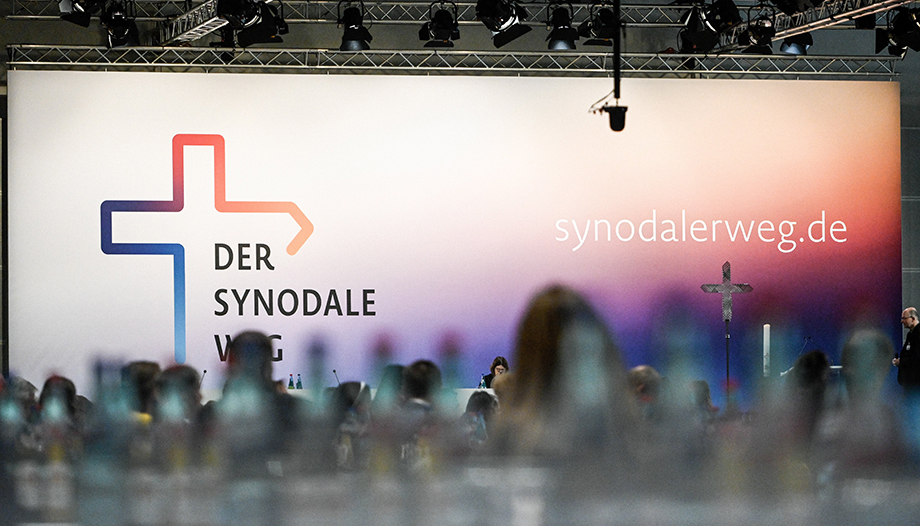 Germany, towards another Church?
Germany, towards another Church? "Are we facing a new ethic of sexuality in the German Synodal Way?"
"Are we facing a new ethic of sexuality in the German Synodal Way?" Synodal path in Germany reproached for "abusing abuses".
Synodal path in Germany reproached for "abusing abuses".The Holy See has made public a brief statementThe communiqué, in Italian and German, with clear warnings to the so-called Synodal Way of Germany, which it reminds that it does not have "prerogatives to force the bishops and the faithful to adopt new forms of government and new doctrinal and moral orientations". The communiqué stresses that it seems necessary to clarify these points in order to "safeguard the freedom of the People of God and the exercise of the episcopal ministry." The intention of the Synodal Way to make decisions regarding the direction of the Church, ministries or moral teachingThe Synodal Way, outside of Rome and the universal Church, as well as the worldwide synodal process, lacks any foundation. Rather, the proposals of the Synodal Way should be addressed to the universal synodal process.
The sender of the letter is "the Holy See" and not a specific Vatican dicastery; it therefore emanates from the supreme authority of the Church, with the endorsement of the Pope, from whom a key phrase is quoted from the "Letter to the People of God on Pilgrimage in Germany," which Pope Francis sent in 2019. The statement was made ahead of the celebration of the fourth Assembly of the Synodal Way, in Frankfurt from September 8-10. It reads as follows:
"In order to safeguard the freedom of the People of God and the exercise of the episcopal ministry, it seems necessary to clarify the following: the "Synodal Way" in Germany is not empowered to force the bishops and the faithful to adopt new forms of government and new doctrinal and moral orientations.
The Pope's letter to the synodal journey
It would not be admissible to introduce new structures or official doctrines in dioceses before agreement has been reached at the level of the universal Church, since this would constitute a violation of ecclesial communion and a threat to the unity of the Church. In this regard, the Holy Father recalled in his letter to the People of God on pilgrimage in GermanyThe universal Church lives in and from the particular Churches, just as the particular Churches live and flourish in and from the universal Church; if they were separated from the universal Church, they would weaken, perish and die. Hence the necessity of always keeping communion with the whole body of the Church alive and effective".
It is therefore desirable that the proposals of the journey of the particular Churches in Germany should lead to the synodal process through which the universal Church is passing, in order to contribute to mutual enrichment and to bear witness to the unity with which the Body of the Church manifests its fidelity to Christ Our Lord.""
This statement of the Holy See comes after bishops from all over the world have written to the German Bishops' Conference expressing their concern about the drift of the Synodal Way: both the President of the Polish Bishops' Conference and the Bishops of the Nordic countries, first, and - in April - a letter addressed by more than 100 cardinals and bishops from all over the world, mainly from the United States and Africa, warned that the radical changes in the doctrine of the Church advocated by the process could lead to schism. In June, Cardinal Walter Kasper, who is considered close to Pope Francis, warned that the German process would indeed run that risk if it did not heed those objections.
A new warning
The Holy See's communiqué also came a week after the President of the Central Committee of German Catholics (ZdK) - and of the Synodal Way - Irme Stetter-Karp, wrote an opinion piece in a major weekly newspaper in which she said that "abortion must be made possible throughout the country", including that a "reflection was needed on how to guarantee the offer throughout Germany, also in rural regions, which would also include the training of medical students".
The press officer of the German Bishops' Conference, Matthias Kopp, immediately rejected this demand: "The position of ZdK President Irme Stetter-Karp on the need to offer abortion nationwide contradicts the position of the German Bishops' Conference. Instead of making abortion possible nationwide, we need an offer of qualified counseling for women." The following day, Stetter-Karp in turn rejected Matthias Kopp's statement: "If, after counseling, the woman decides to terminate the pregnancy," it should be possible: "The right of self-determination is of no use if there are insurmountable obstacles. These statements have led to a collection of signatures calling for the resignation of Stetter-Karp as president of the ZdK.
And even more recently, on July 18, the Secretary of the Synodal Way Marc Frings has declared that he wants to change the doctrine of the Church on homosexuality: the Synodal Way, with its texts, is "a conscious pronouncement" against the Catechism of the Catholic Church, "which since the mid-seventies has dealt with homosexuality in a critical, derogatory way and with the accusation of sin". In the writing of the Synodal Way to which he refers, there are comments on "the change of opinion" -in relation to Catholic doctrine- on marriage and other aspects of sexuality.











